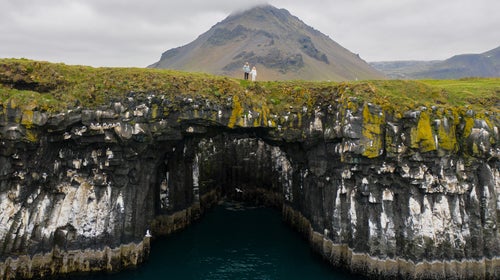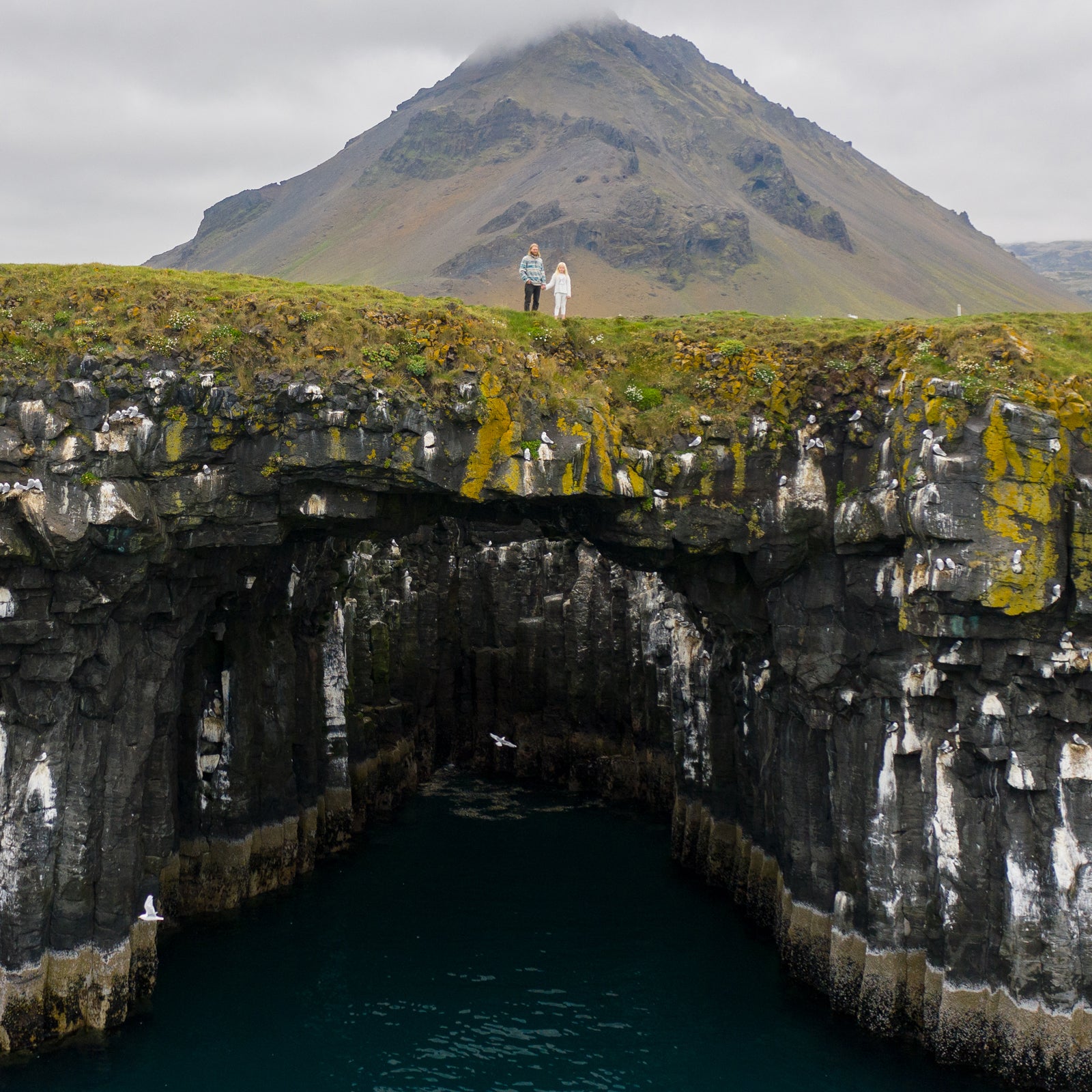From the moment you become a parent, you are guaranteed to spend the rest of your life second-guessing every choice you make. All of it boils down to two questions: Am I doing what I’m supposed to do to keep this kid alive? Am I giving this little person the ability to walk their own path and lead a healthy, productive, and happy life? Most parents learn to live with the decisions they make—you have to for sanity’s sake—but the uncertainty of it all never goes away.
Chris Burkard’s��new short film, Unnur, , offers a cinematic��exploration of that uncertainty, and how one parent has learned to be at peace with his unconventional choices. The 17-minute documentary follows Icelandic adventure photographer and surfer Elli Thor, a single dad raising his eight-year-old daughter, Unnur—named after one of the Norse god of the sea’s nine daughters—in a remote A-frame cabin on the coast of Iceland, where they spend the bulk of their time on the beach. (Thor shares custody with Unnur’s mother, who’s only glimpsed in the film when he drops his daughter off at her home in town.) They’re miles away from other people by design: Thor’s plan is to share his passion for the ocean and surfing with Unnur, rather than succumb to societal expectations about how to raise his daughter.
Thor’s simply following the pattern laid out by his own parents, who never stopped doing what they loved, either. His mother was the first woman to join Iceland’s search and rescue team, and she and Thor’s father��spent most of their time raising their own children in the country’s wild spaces. “I think if you’re��raised outdoors, even if you move away from it for a little bit of time, it’s always there. It sticks with you,” Thor��says in the film. “It was a great way to grow up.”
Building on that experience, he followed his own path to become a professional kayaker, taking on some of the most challenging waters in the world. Then, a decade ago, on a river in northern Iceland, he got trapped beneath a waterfall and nearly drowned, washing up half a mile downstream. After that he left kayaking and, for a time, his life outdoors, until later discovering surfing, a budding sport in his country. Still, he struggled with the question of why he survived the accident—until his daughter was born. Unnur’s arrival gave him a renewed sense of purpose as well as an ongoing internal dialogue as to whether or not he was doing right by her.
Burkard has been making adventure films for a long time, and you’ll recognize his epic cinematography here. He shoots the rugged Icelandic coast and swells lapping up the beaches as though they’re both supporting characters, and they are. Without hitting you over the head with it in the script, Burkard’s��camerawork makes clear the appeal of the land and sea and why Thor’s opted for this life.
However, Unnur represents a significant departure from Burkard’s previous work. It’s a journey into narrative storytelling, rather than what he calls the “surf porn” he’s accustomed to shooting. “I got to know Thor a few years ago surfing in Iceland, and we became friends,” Burkard��recounts. “Later��he told me the story about almost drowning and how he still struggles with that experience as a father.” It was the first time Thor had opened up about his accident to someone outside of his own family, who only found out about it when they saw it relayed on the local news.
There’s a personal element to the story that motivated Burkard, too. Growing up with a single mother, he saw her struggling to balance the challenge of raising a strong, independent kid without being held back by��the fear of the unknown, the so-called safer path. Now a father of two boys himself, Burkard, like so many of us, constantly wrestles with the question of how to responsibly raise kids without giving up our individual passions. It’s��a fine line to walk. Go all in on your passion, and you could alienate��your offspring or make��them resent the things you love. Instead,��both Burkard and Thor have chosen to share their passion with their kids, even as they debate��internally with the more conventional notions of parental responsibility, such as the risk��that comes with giving kids more freedom or the struggle that can ensue when��dragging them to the beach while their peers are off to soccer games or enjoying��Xbox time.
“I want them to know that I love what I do, and I want them to love what they do, too,” Burkard says. “I made this as an advocacy piece for parents.”
Unnur is a quiet film. There’s not a lot of dialog, and it doesn’t really need it. Thor and Unnur, who we don’t hear from much at all, don’t have to say much for the audience to see the deep level of trust and affection the two share. Burkard’s lens captures those sentiments nicely in Thor’s world-weary expressions and the wonder in his daughter’s face as she stares out at the ocean.
Thor lives and breathes��the ocean—it’s what gave him a second chance at life—but he’s not forcing Unnur into a career as a professional surfer like some obnoxious Little League parent yelling at their kid from the bleachers because they’re not throwing the perfect curveball at ten��years old. In fact, you only see her on a board once in the film. The two while��away most of their time playing on the beach, splashing in the waves, or collecting shells and feathers. Sometimes she watches him or does her own thing while he surfs.
And though his parenting approach is one of the more extreme examples of living a life outdoors, it’s applicable to anyone with their own brood. All parents balance the risk and responsibility that come��with raising kids, but we don’t have to stop doing what we love when children arrive. Even if your adventures become limited to weekend peak bagging or a backcountry canoe trip,��you can still take your little ones with you.
“Like my parents did, I share my passion with her in hopes that she’ll grow the courage to do life’s hardest thing, to choose her own path, not the one society chooses for her,” Thor explains. “If I can do that, I’ll go to the grave a happy man.”
The most difficult part of parenting is that we never really get a definitive answer as to whether what��we’re doing is working, if we’re��successfully straddling��the line between risk and responsibility. You just have to accept the constant uncertainty of the dilemma��and proceed.
“I don’t know if I’m doing right,” Thor says,��“or if I’ll ever know, but the most important thing is that we’re doing it together.”
In the final scene of Unnur, Thor carries his daughter into the house and puts her to bed at the end of a long day at the beach. As he says goodnight, she whispers her only line in the film: “Can we go surfing again tomorrow?”


